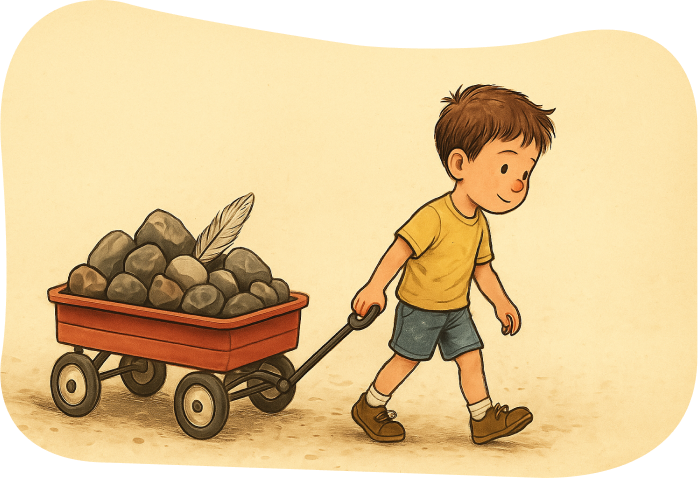
Kids collect things that don’t always make sense to adults. A cracked marble. A feather from the yard. A rock that looks like every other rock on the sidewalk. To us, it’s random clutter. To them, it’s treasure.
And if you slow down and really pay attention, there’s a lot hidden in that little wagon of rocks. Lessons for them, sure. But also lessons for you.
Kids See Value in Their Own Way
When your child bends down to pick up a rough piece of stone and calls it “special,” it can feel odd. But here’s the thing: kids don’t see value the way we do.
You look at price tags. They look at feelings.
That shiny rock matters because it came from the park where they laughed on the swings. That jagged stone matters because it looks like a dragon’s tooth in their imagination. They aren’t worried about whether it’s worth money. They’re deciding what matters to them.
And that’s something you can learn too: not everything important has to be expensive or rare. Sometimes meaning itself is the value.
Heavy Loads Tell the Truth About Life
Picture your child pulling a wagon that gets heavier with each rock. At first, it’s exciting. Each new treasure feels worth adding. But halfway down the block, the wagon drags. The handle digs into their little hands. They stop and rest.
Now think about your own life. Your “rocks” aren’t sitting in a wagon. They’re in your head and on your shoulders. Deadlines, bills, appointments, arguments, fears. Each one feels small on its own, but together they weigh you down.
When you see your child take a break, you’re reminded that it’s okay to pause. You don’t have to keep dragging the weight without stopping. And maybe you don’t need to carry every rock in the first place.
Curiosity Turns Small Things Into Big Lessons
One of the best parts of a wagon of rocks is the endless questions that come with it.
“Why does this one have holes?”
“Could dinosaurs have stepped on it?”
“Why is this one heavier even though it’s smaller?”
These aren’t random. They’re your child’s way of making sense of the world. A rock isn’t just a rock. It’s a mystery waiting to be solved.
And here’s what parents can take from that: you don’t need all the answers. You just need to join the wondering. Sometimes saying, “That’s a good question. What do you think?” means more than a full scientific explanation.
As adults, we tend to stop asking questions unless they’re useful or practical. Kids remind us that curiosity doesn’t need a purpose. It just needs space.
Treasures Feel Bigger When Shared
After a long day of collecting, most kids want to show you what they found. They don’t want to keep the wagon to themselves. They want you to sit beside them, look at each rock, and listen to why it matters.
That’s the real treasure: the chance to share.
Think about it. Your child isn’t really asking you to judge their rocks. They’re asking you to notice them. To step into their world for a moment. To say, “I see what you see.”
And isn’t that what all of us want? To be noticed, to be understood, even if what we’re holding looks ordinary to someone else.
Ordinary Things Carry Big Lessons
You could say it’s just a wagon of rocks. But kids have a way of turning ordinary things into symbols.
If you’re paying attention, you’ll realize these little lessons are the same ones you struggle with as an adult.
What It Means for You as a Parent
Here’s what a wagon of rocks can remind you:
So when your child proudly shows you a rock they pulled from the dirt, resist the urge to dismiss it. Sit with them. Ask them why it’s special. Smile, even if you don’t quite get it.
Because one day, that little wagon will be gone. But the lessons it carried, for them and for you, will stick around.
Quick Links
Useful Links
Copyright © 2025 Karen Sullivan. All Rights Reserved.